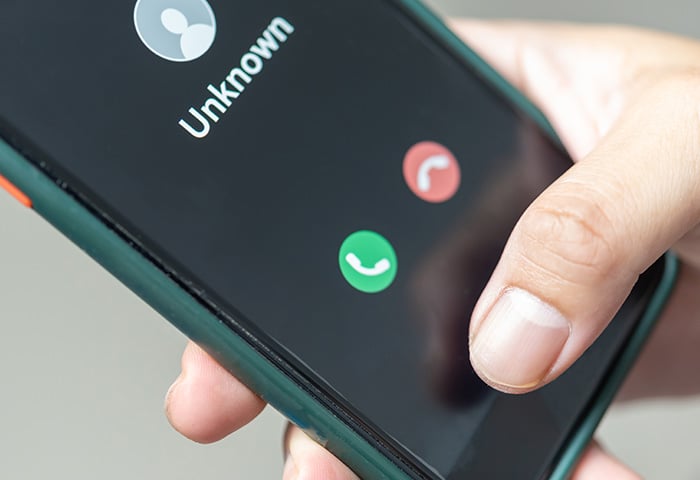What is cyberstalking?
Cyberstalking is defined as repeated, unwanted contact or harassment by someone through electronic communication, such as email, social media, or text messages. What constitutes cyberstalking may vary based on the type of harassment. But if the repeated contact is unwanted, annoying, or threatening, it can be considered cyberstalking.
Cyberstalking has become a significant problem on a global scale. According to the Pew Research Center, 41% of Amerians have been harassed by an online stalker, and an even larger number (66%) have witnessed online harassment directed at others. Characteristics of such harassment include slander, defamation, threats, hacked emails, and identity theft.
Cases of cyberstalking have skyrocketed in line with the number of technological devices and social media platforms available, the growth of which often makes it easier to find and expose someone’s digital identity, including their location, interests, and personal networks. The convergence of cyberstalking and social media has made the problem even worse, exposing more and more young people to abuse from online stalkers.
What do cyberstalkers do
Online stalkers repeatedly contact or follow victims online. Internet stalking can involve subtle acts, such as publicly commenting on social media conversations, or overtly aggressive acts, such as sending threatening messages to the victim or their family and friends. Cyberstalkers may even resort to doxxing their victims.
Similar to patterns seen in physical stalking, the majority of cyberstalking victims are female. In the US, “one out of every 12 women and one out of every 45 men have been stalked online at some time in their lives.” The anonymity of the internet — and the accessibility of personal data — has made cyberstalking all the more prolific.
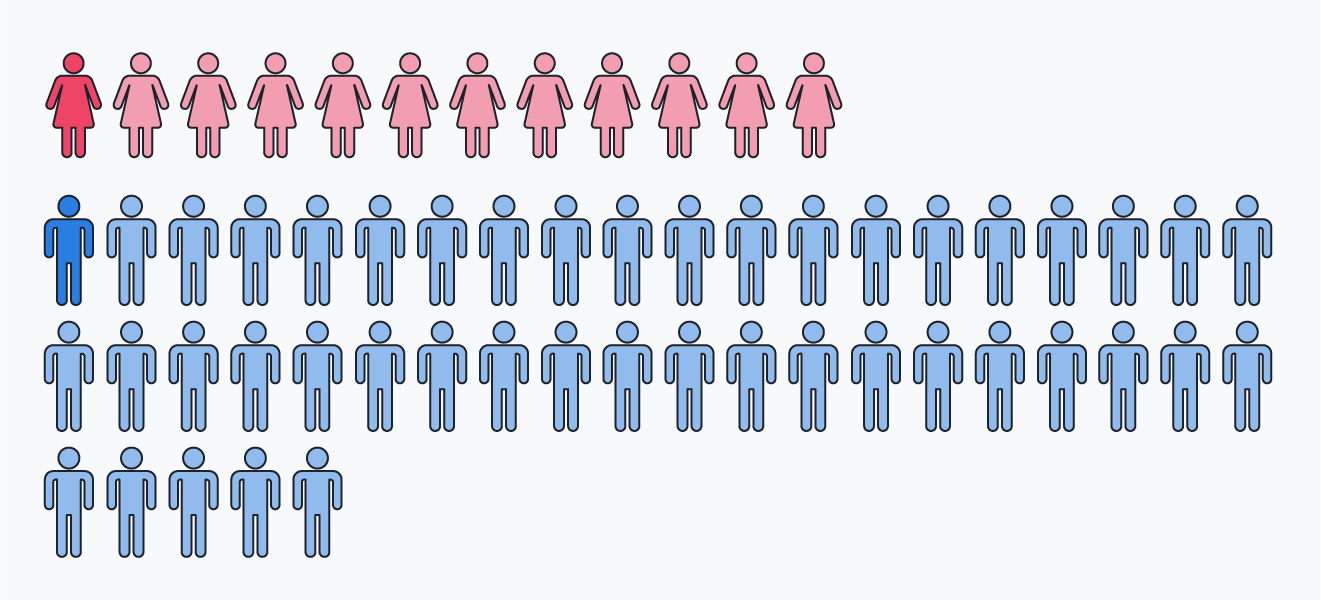 One out of every 12 women (8.3%) has been stalked at some point in their lives.
One out of every 12 women (8.3%) has been stalked at some point in their lives.
Knowing how to catch a cyberstalker can be tough, because cyberstalking is also defined as fanatically collecting information about someone online. The tracks of stalkers on social media may not be visible for a long period of time. Cyberstalkers can be methodical, purposeful, and obsessive.
Cyberstalkers are not always strangers either. They can be former, estranged, or current partners, or even spouses using cyberstalking techniques to take action in real life.
Signs of cyberstalking
How do you know if someone is stalking you? There are a few situations prone to stalking, as well as signs that you may be a cyberstalking victim. But even if you haven’t been victimized already, you should be careful about oversharing online. Exposing personal information about yourself, your children, family members, where you live, and other details is always risky.
Internet stalkers are not always as secretive as you might think. They can be blunt in their pursuit and let their obsession betray signs of cyberstalking.
Examples of potential cyberstalking signs include:
-
A former partner or spouse who wants to know what you’re doing at all times.
-
Someone "trolling" or following your social media accounts.
-
Someone continually looking at your social media profiles across multiple platforms.
-
Someone contacting people you know to see if you received their messages.
Catfishing
Some online stalkers engage in catfishing, an especially deceptive and intricate form of fraud or abuse that involves someone creating a fake online identity to target and stalk someone on the web.
The aim of catfishing is to persuade the victim into letting their guard down and revealing personal information about themselves that they might otherwise not reveal to the stalker. The information may seem innocent, but the stalker has sinister intentions, such as to get money out of you, or embarrass or humiliate you.
To catch a catfish and protect yourself from an online stalker, here's what you should do:
-
Check their online profile and examine the types of photos they post of themselves. If there are only selfies, with no visible connection to friends or family, that may be a sign of a fraudulent profile.
-
Do a reverse image search on Google to check their online photo against other photos available online. You may find the person’s profile picture connected to multiple online profiles that use the same photo but with different names.
-
Ask the person if you can have a video call. Excuses may be a sign of catfishing.
-
Check to see how many friends they have on social media. A low friend count may indicate a fake profile — of course, that can also be a less nefarious signal.
Catfishing may seem like simply an annoying inconvenience, but it's a dangerous form of cyberstalking that can lead to sextortion and other forms of abuse.
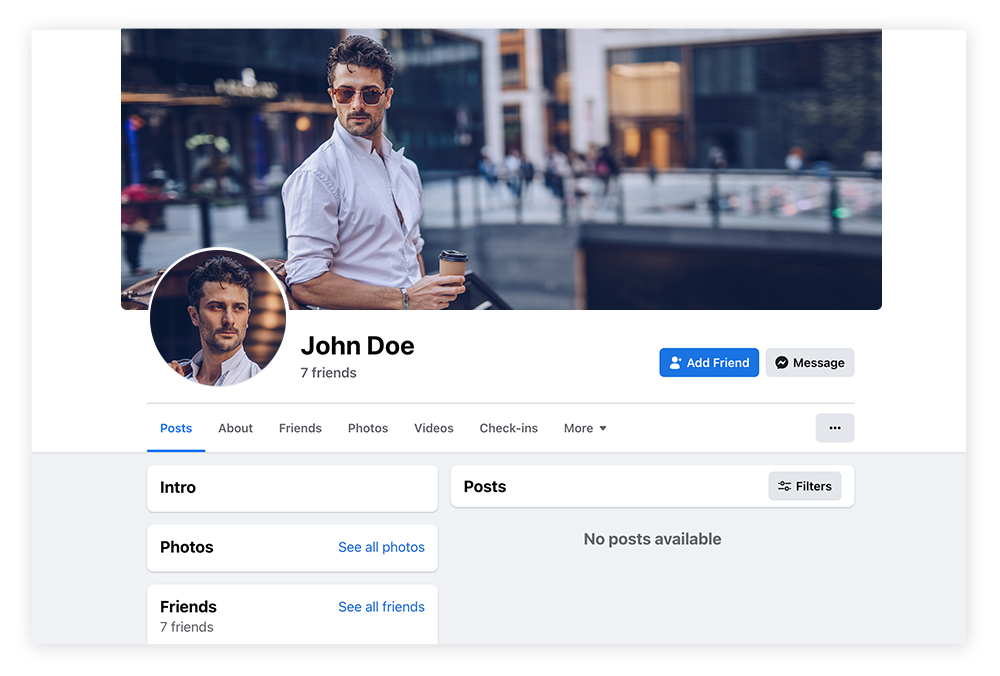 A catfishing profile often includes stock images and very little personal information.
A catfishing profile often includes stock images and very little personal information.
How to prevent cyberstalking
Cyberstalking prevention involves proactive measures to safeguard personal data, block Facebook and other social media accounts, and avoid oversharing online or with strangers. Here are the best ways to protect yourself against online stalking.
 Digital hygiene
Digital hygiene
To deal with an online stalker, you need to be aware of how you present yourself online and on social networks. If Google knows something about you, a cyberstalker may too. Good digital hygiene means controlling your digital presence and taking action if you think you’ve been hacked.
Consider this your how-to-avoid-online-stalkers checklist:
-
Google your name to see what information a potential cyberstalker may find out about you — such as your nickname, phone number, birthday, or address — and learn how Google uses your data. Take action if necessary to remove identifiable information cyberstalkers may find through Google hacking.
-
Search your social media profiles and delete information you wouldn't want in the hands of an online stalker. Some cyberstalkers are strangers, others are not. As a general rule, don’t accept friend requests from people you haven’t met in person.
-
Opt out of data broker lists which sell your data to third pirates. Data brokers may have questionable ethical standards, and they may sell data to the highest bidder, not just to reputable companies.
-
Create a decoy email address and use this when registering to social media networks or websites. Alternate emails will help avoid spam, and your personal email won't be revealed if the online service doesn’t have strong security safeguards.
-
Don’t complete unnecessary online forms or feel pressured to include personal information like your address or date of birth when registering to a site or service. Reveal only what you need to, and consider using fake info if necessary.
-
Share less information online. The less information you freely share online, the better. Strike a healthy balance between preventing cyberstalking and being part of an online community, which inevitably involves sharing ideas, thoughts, and stories.
-
Use a non-identifying user profile picture. Avoid using a photo which shows your address, location, or other easily identifiable info. You can show your face and still be stealth.
-
Take action if you get hacked. If you think your phone has been hacked or a website you use has been hacked, take responsibility for cleaning up what you can. Change account passwords immediately to contain the data breach.
 Strengthen your privacy settings
Strengthen your privacy settings
To enhance your cybersecurity, strengthen the privacy settings across your devices (phone, computer, tablet), user accounts (social media, email security), and the tools you use to access the internet (Wi-Fi, VPN).
-
Keep your social media profiles private and make your posts visible only to your friends to avoid being stalked on social media.
-
Use secure e-messaging apps that encrypt your data. The best secure messaging apps will ensure your communications can’t be intercepted by online stalkers, ISPs, or the government.
-
Don’t use public Wi-Fi without a VPN. There are many reasons to use a VPN, including the fact that it hides your IP address and encrypts your data.
-
Check your devices for spyware to ensure your accounts and information are not compromised. Spyware is a sneaky type of malware that can go undetected for a long period of time.
-
Don’t open attachments from unrecognizable email addresses. Infected attachments are an easy way to spread computer viruses. Open attachments only from trusted emails.
-
Create strong and unique passwords for all your accounts, and use one of the best password managers to keep track of them.
-
Disable geolocation or GPS on your phone to stop location-based online tracking.
-
Use a masked email and phone number, and don’t give out your address or phone number publicly.
-
Don’t provide sensitive data over the phone or online. If somebody calls you to request personal information, ask to call them back and verify their identity by using the main number of the company or organization.
-
Install antivirus software like AVG AntiVirus FREE. Top-notch digital hygiene isn’t enough to protect you from all the online threats out there. Antivirus software adds another layer of protection.
 Update your software
Update your software
If you have outdated software, there’s a risk that a hacker could exploit an unpatched vulnerability. Companies and app creators regularly release updates to fix security flaws, as well as add new features. If you notice that your iPhone or Android isn’t getting updates, go to your phone’s settings and check to see if any updates are available.
After updating your software, consider whether your smartphone is tracking you. Smartphones and other electronic devices track your location and store sensitive data. This tracking is often done for benign reasons, or to ensure the apps you use can service you better. But sometimes the extent of the tracking can verge on surveillance.
Using the best antivirus software and installing an anti-tracking app can help keep your data safe and reduce your risk of being exposed by a cyberstalker.
How to deal with online stalkers
It is easier to prevent cyberstalking rather than to deal with the consequences. You should know what to do if someone is stalking you online before it happens. Help yourself by taking a proactive stance against cyberstalkers.
Stop the communication
Tell the person to stop contacting you. If they refuse, block them on social media and contact their internet service provider.
Stalking on social media is all too common, so Facebook, Instagram, Twitter, and nearly every other social media platform provides support to block electronic harassment. If the harassment is sent via email, set up a filter to send their emails directly to a spam folder.
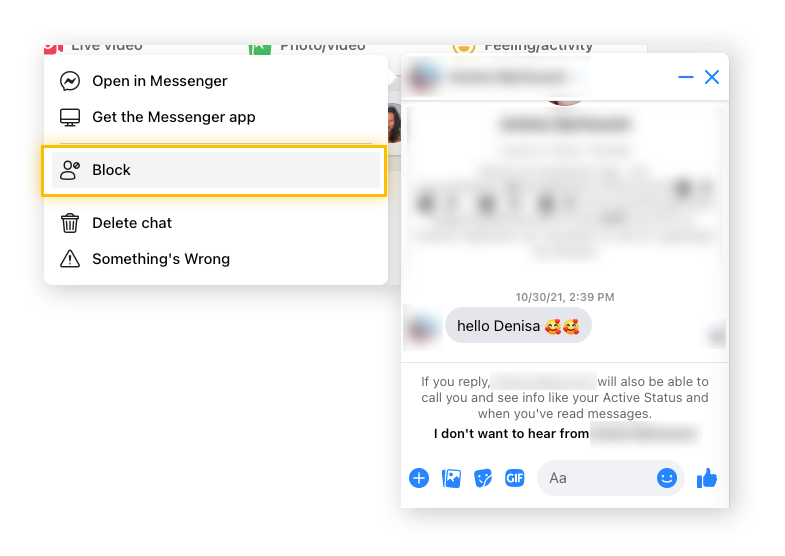 Block unwanted messages online.
Block unwanted messages online.
Check your security
You never know the true intentions of a cyberstalker, or the lengths they’ll go to stalk you. Perform an overall security check of your online accounts and devices to stop cyberstalking. Use an anti spyware tool to make sure shady apps aren’t on your phone and create strong passwords for your online accounts. If a cyberstalker puts spyware on your iphone or spyware on your Android, remove it immediately.
Keep evidence
If you think you’re being stalked online, keep evidence to report to the police. Even if it seems your cyberstalker is gone, you need to document the abuse. Take screenshots of messages they've sent you, including a timestamp, and save it in case you need to access it later. If you need to report that someone is stalking you online, you’ll want evidence to back up your claim.
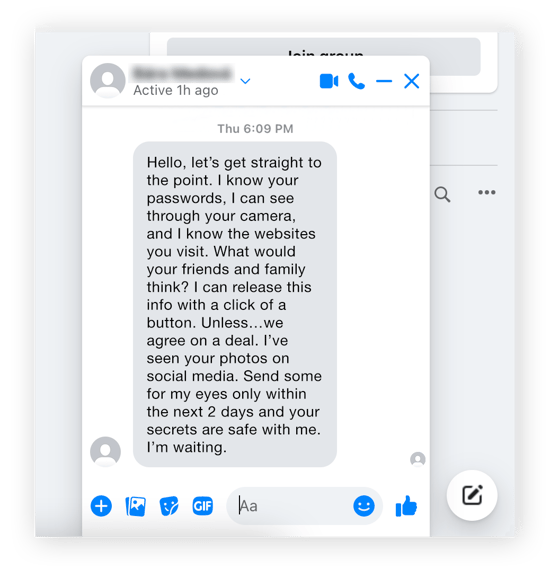 Take screenshots of messages from stalkers so you have evidence if you need to report it.
Take screenshots of messages from stalkers so you have evidence if you need to report it.
Use fake profiles as a decoy
If someone is cyberstalking you, you can try to mislead the attacker by increasing the amount of fake information about you. Set up a decoy account on the channel they know you use and create an anonymous, real-looking profile to help you shield your own.
Report cyberstalking to the police
Many police departments have a special cyberstalking team and know exactly how to report cyberstalking. Even if you don't have enough evidence that constitutes stalking and prosecution, the report will be on file and the police can help you deal with future attacks.
Cyberstalking laws
Cyberstalking is illegal and considered a legitimate form of abuse. Is Googling someone stalking? No. But if it becomes repetitive and obsessive, it can quickly unravel and become illegal.
If you think you’re being stalked online, consider reporting it to your local law enforcement agency. There are plenty of examples of cyberstalkers being held accountable, such as the eBay executives who were charged with online harassment or a California man pled guilty to sextortion.
There are several existing laws across the US and UK that target cyberstalkers. While cyberstalking laws in the US vary from state to state, stalking and harassment are a criminal offense in all 50 states.
California created the first statewide cyberstalking law back in 1999, and other states have followed suit, such as Illinois. But there’s still no federal legislation to address stalking by electronic means — the majority of legislation exists only at the state level.
Cyberstalking also remains subject to general laws on harassment, such as the 1994 Violence Against Women Act in the US and the 1997 Protection from Harassment Act in the UK.
Resources to help defend against cyberstalking
There are several agencies, NGOs, and free resources available to help you report cyberstalking. While you should absolutely pursue legal methods to catch a cyberstalker, preventive solutions are vital to avoid online abuse. Here are some helpful resources to help you learn more about preventing cyberstalking:
Protect your privacy online with AVG Secure Browser
Keeping your anonymity online is an important step toward cyberstalking prevention. AVG Secure Browser includes built-in anti-tracking features, such as anti-fingerprinting technology and forced HTTPS encryption, that let you browse the internet freely without giving away your personal identity. Install our free secure browser today.

 One out of every 12 women (8.3%) has been stalked at some point in their lives.
One out of every 12 women (8.3%) has been stalked at some point in their lives. A catfishing profile often includes stock images and very little personal information.
A catfishing profile often includes stock images and very little personal information. Block unwanted messages online.
Block unwanted messages online. Take screenshots of messages from stalkers so you have evidence if you need to report it.
Take screenshots of messages from stalkers so you have evidence if you need to report it.
